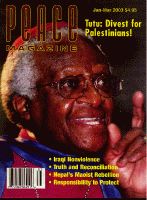
Peace Magazine Jan-Mar 2003, page 7. Some rights reserved.
Search for other articles by Raid Fahmi here
There are two main objectives in U.S. policy towards Iraq: disarmament and regime change and the main concern facing Iraq is the latter. While there is an international consensus on Iraqi disarmament, there is not a unified stance on regime change. Change is a necessary and worthy end, but force is not the optimal means.
The international community must look at the plight of the Iraqi people: they have been victims of an oppressive regime, have endured two major wars (i.e., Iran and Kuwait) as well as several internal wars, and have suffered multiple hardships as a result of the economic sanctions. The Iraqi regime too has already suffered severe losses, since it moved from a regime that the U.S. had previously supported to one it now condemns. The Iraqi people are hostages of sanctions and the regime. Confronted by a "survival economy," they must work upwards of 12 to 14 hours a day in order to meet basic needs.
Yes, change is necessary, but not through war. There are other means to attain this end of necessary change - namely through active international support for human rights and democracy. Despite the many recommendations to these ends in reports pursuant to Security Council resolutions calling for respect for human rights and democratic accountability in Iraq. To this point, the Security Council has not acted on any of them. International pressure and initiative on this front would lead to an immediate amelioration of the Iraqi internal situation.
Saddam Hussein is starting to feel personally threatened and has already made some limited concessions to the Iraqi people that should be immediately built upon. The key is advocacy for internal change that is brought about by the Iraqis themselves. The Iraqi people should be the main focus of international support. They need help and it should come through UN-sanctioned support for human rights and democratization and the effective implementation of UN Resolution 6881. The Iraqi people can act, provided there are some possibilities and some room to move. This is the type of non-military international intervention that they need. After all, the main guarantee for sustainable Iraqi disarmament is having a government in Baghdad that is accountable. In this endeavor, international NGOs have an important role to play. They are another effective means to mobilize support and perhaps the best way of expressing solidarity with the people and promoting a pacific Iraq.
1 In this resolution the Security Council condemns the repression of the Iraqi civilian population in many parts of the country, demands that Iraq immediately end this repression and "expresses the hope that an open dialogue will take place to ensure that the human and political rights of all Iraqi citizens are respected."

Peace Magazine Jan-Mar 2003, page 7. Some rights reserved.
Search for other articles by Raid Fahmi here